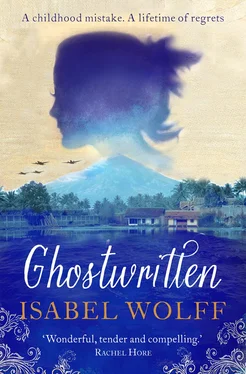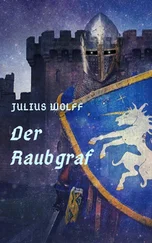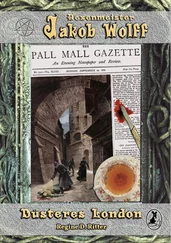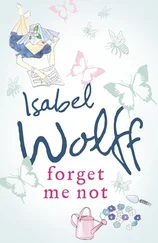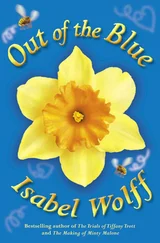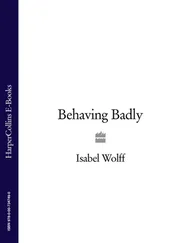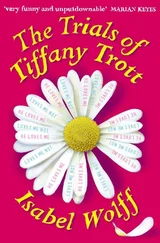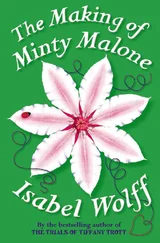When we first got there, I’d lie in bed, unable to sleep because of all the weird noises of the tropics – the trilling of crickets, which was always especially loud at night, or the sudden shriek of a bird or a boedung , one of the monkeys in the rubber forest that surrounded our house. Sometimes there’d be the howling of pye-dogs, and the strange, guttural cries of the tokeh, large stripy salamanders that sounded like frogs. If you heard the tokeh seven times in a row you could make a wish; so I’d listen to their croaks, and would get upset if I lost count and had to start all over again.
Our house was large, single storey, like most houses in the East Indies, and built of brown brick with a roof made of curved red tiles. It had a circular drive and low, wide steps on which my mother placed pink and white orchids in big pots. All the rooms had high ceilings and ceramic floors, which were polished with slices of coconut tightly wrapped in muslin. I still think of this house as my childhood home.
Around the sides of the house were covered walkways called empers , and behind it was a smaller house called a ‘pavilion’ in which were the kitchen, the gudang or storeroom, plus the washing facilities, bathroom and loo. We had an enormous garden, in which was a banana palm, a mango tree, a cherimoya and, at the end, a big waringin – an Indian fig, with a thick, rippled trunk and long aerial roots. Bats roosted in that tree. At dusk we’d see them spread their cloak-like wings and swoop out.
My mother loved gardening and created wonderful flowerbeds in which she grew roses, gerbera and lilies, and I’d make the petals into dresses for my dolls. The garden was full of exotic birds – hoopoes, golden orioles, bulbuls and humming birds, which hovered over the jasmine like iridescent bees. But my favourite bird was the Java sparrow because it looked like a puffin.
As Dutch colonials we had a privileged life. We employed a gardener, Ismail, who I thought of as extremely old, because his hair was grey, but he was probably only in his forties. We had a maid named Jasmine, who was married to the plantation’s head foreman, Suliman. They were in their mid-thirties but had no children, which caused them great sadness. Because of this, I think, Jasmine was very affectionate to my little brother, Peter, and me.
Jasmine and my mother were always cleaning, because in the tropics mould and mildew take hold very quickly. They’d hang the rugs up in the sun and bang the weevils out of them. They’d take books off the shelves and wipe the covers and give all the clothes a vigorous shake. I remember once my mother being very upset about a favourite dress of hers that Peter, ill with typhus, had thrown up on. She had taken it off and left it in the pavilion: when she went to wash it the following morning, the part he’d been sick on had been eaten away.
Every week the floors had to be disinfected or the insects would move in. If termites showed up we’d have to place the furniture legs in saucers of carbolic acid. Once, we forgot to do this with our piano, and they destroyed it from inside, leaving hillocks of sawdust beneath. And I remember, once, seeing a huge bird spider scuttle across my bedroom floor. It was so large that I could hear its feet clicking on the tiles, a memory that still makes me shudder seventy years later! So I remember this constant battle we all waged against bugs – cockroaches and moths, stick insects and giant centipedes the length of a forearm; creatures that I could never even have imagined back home. But I always thought of the East Indies – never the Netherlands – as home .
Although I’m Dutch, I have almost no childhood memories of Holland. I know about my early years there only from my parents, Anneke and Hans, and from my grandparents, ‘Oma’ and ‘Opa’, who lived near to us in Rotterdam. My grandfather worked on the canals, leading the horses along the towpath as they pulled the barges. I’m sad to say that I can barely remember him, because by the time we’d returned home he had died, in the terrible ‘hunger winter’, before Holland was liberated from the Nazis. I know that Opa was a simple man, with little learning, while Oma was well-educated, well-read, and determined for her daughter to be the same. So my mother went to high school, then on to college where she studied to be a teacher. She met my father ice-skating and they were married within a few months.
My father worked for an electrical engineering company but he was laid off because of the slump. According to my mother, he was in despair, especially as by that time they had two children; but then he got a job as the manager of a rubber plantation in West Java. He went out there first. Three months later my mother, Peter and I followed.
We left for Java on New Year’s Eve. I know this because my mother used to say that it had seemed such an auspicious day for us to be setting off for our new life. But she could never have imagined that the ‘earthly paradise’ to which we were sailing would, within a few years, become a living hell. But to Java we went, taking with us a single crate that contained my parents’ wedding china, their books and our clothes.
Конец ознакомительного фрагмента.
Текст предоставлен ООО «ЛитРес».
Прочитайте эту книгу целиком, купив полную легальную версию на ЛитРес.
Безопасно оплатить книгу можно банковской картой Visa, MasterCard, Maestro, со счета мобильного телефона, с платежного терминала, в салоне МТС или Связной, через PayPal, WebMoney, Яндекс.Деньги, QIWI Кошелек, бонусными картами или другим удобным Вам способом.
